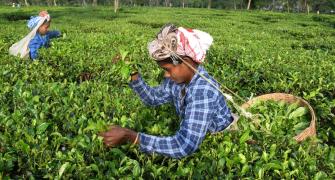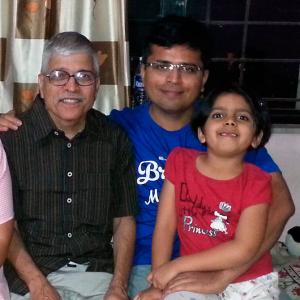Blood loss from menstruation can cause anaemia.
Over-exercising increases the risk of osteoporosis.
Presenting seven health issues that are severely affecting mothers.

Being a woman is no mean feat.
We are independent and strong. We juggle our personal and professional lives with ease, whilst constantly fighting for equal rights and stature in the society.
However, in this juggle and fight to the top, we are often bogged down by the most unexpected of things. One of which is a health problem.
And Indian women are not just bound to be hit by one, but by these unceremonious health problems.
Here are seven health problems that are severely affecting Indian mums.
#1. Premenstrual Syndrome (PMS)
Many of us joke about PMSing, but it's not a joke when it take a toll on your health.
Women go through a phase of bloating, cramps, constipation, breast tenderness or swelling and even joint and muscle pain. Add to that, severe mood swings and emotional imbalance.
In fact, these symptoms can occur one or two weeks before the bleeding begins.
In an Indian study, it was revealed that headache was the most common symptom of PMS among Indian women.
#2. Vaginal Infection
Characterised by itching, redness around the vagina, abnormal discharge and even odour, a vaginal infection or vaginitis is another common health problem in India.
This is often caused by extreme illness, tight clothing, vaginal douching, creams, or sexual activity.
This health issue is caused by the disruption of the normal bacterial environment inside the vagina.
However, the good thing is that a vaginal yeast infections can be treated with antibiotic medicines which are available over-the-counter.
#3. Polycystic Ovarian Syndrome
The Polycystic Ovary Syndrome (PCOD) is a condition where a woman develops enlarged ovaries and small follicular cysts that are of the diameter 0.5 to 1 cm.
This leads to a collection of eggs in the ovary that cannot be discharged from the body, and is quite prevalent among Indian women.
Celebrity nutritionist Rujuta Diwekar, recently stirred an important debate about PCOD with her book The PCOD - Thyroid Book. She admitted during a press conference that "PCOD is growing like an urban epidemic."
Dr Sonia Malik, Southend IVF Fertility Centre, Delhi, spoke about PCOD. "Changes in lifestyle, lack of exercise, dietary habits, exposure to environmental pollution, stress levels and loss of work life balance have become the primary causes of PCOD," she explained.
#4. Endometriosis
If you thought your problems end with the end of your menstrual cycle, think again. Because endometriosis is hitting Indian women hard.
Each month, the cells of the inner lining of your womb (called endometrium) swell and shed during menstruation.
In Endometriosis, the endometrial cells start to grow in other areas of the body. The most common area is the abdominal cavity.
This problem causes irregular bleeding and mild to severe cramping, which may reach the legs. It may even cause infertility in women.
What's worse, it may not even be your fault! Research suggests that endometriosis runs in the family.
#5. Osteoporosis
Health experts peg the number of osteoporosis patients in India at approximately 36 million by 2013.
In this, according to the World Health Organisation (WHO), 70 percent are women!
The cause of osteoporosis ranges from lifestyle changes to the lack of vitamin D in the body, which is responsible for strengthening the bones.
A recent study explains the cause of osteoporosis in Indian women.
"Darker skin pigmentation, recent modernisation of India resulting in working indoor, and reduced physical activity have resulted in limited sun exposure," the study says.
Remember that, in osteoporosis, bones become soft and dissolve within the body.
Over-exercising (or marathon running) -- especially in young Indian women -- increases its risk (primarily due to excessive weight loss and early termination of menstruation).
The only prevention includes lifestyle changes such as no smoking, minimising alcohol intake, regular exercise, consumption of low-salt and calcium and finally, a vitamin D-rich diet.
#6. Urinary Tract Infection (UTI)
This is another very common problem among Indian women.
You may know that women have a shorter urethra as compared to men. This is to prevent any upward movement of germs into the bladders.
However, in a Urinary Tract Infection (UTI), the germs enter the bladder either due to use of an unhygienic washroom or unclean swimming pool.
This health problem may lead to burning pain, frequent urination or constant feeling of urination.
In not-so-severe cases, it can be treated with antibiotics. However, you could also use home remedies.
#7. Anaemia
In a study released in 2014, "more than half of women in India (55 per cent) have anaemia, including 39 per cent with mild anaemia, 15 per cent with moderate anaemia and 2 per cent with severe anaemia."
The most common symptoms of anaemia (fewer red blood cells -- RBC) are fatigue, severe menstrual cramps, brittle nails and in some cases pale skin. This is especially dangerous for expecting mothers.
That's because it eventually translates to low oxygen in the blood.
In fact, blood loss from menstruation, deficiencies of vitamins B2, B6, B12, and even folic acid due to poor eating habits can cause anaemia.
However, intake of dried fruits and nuts and nutritious food that contain these vitamins can supplement lost energy and lower RBC in an anemic person.
*Image for representation purpose only
ALSO SEE
Sleepless nights put women at diabetes risk










